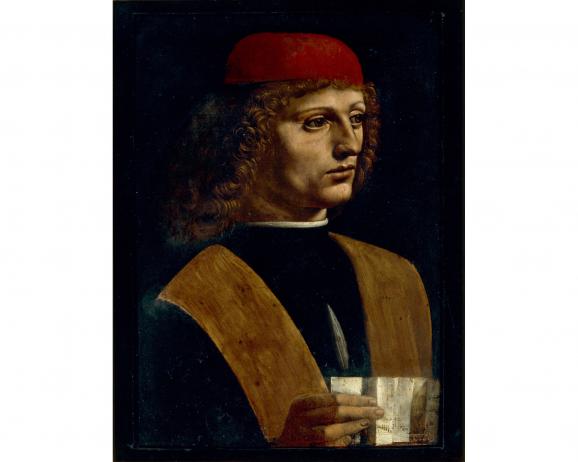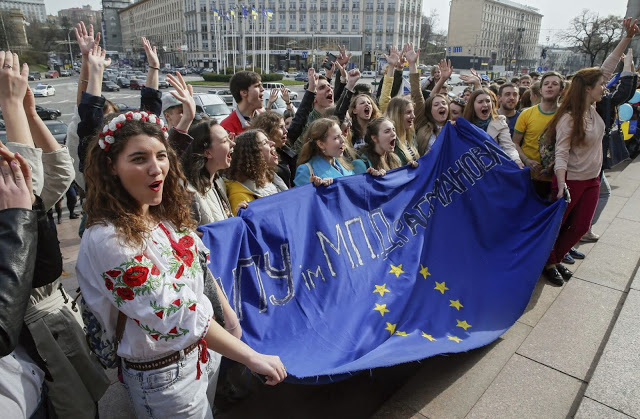Leonardo da Vinci: from "L'Homme de Vitruvius" to "La Scapigliata", five masterpieces from the Louvre exhibition. From "The Vitruvian Man" to "Musician", discover some of the exceptional works lent by the Italian museums for the Leonardo da Vinci exhibition at the Louvre!
A few days before the opening of the great retrospective dedicated by the Louvre to the painting of Leonardo da Vinci (1452-1519), here are some exceptional works lent by the Italian museums, including the famous Vitruvian Man, who almost did not to come to Paris. However, there is still no news of Salvator Mundi, which has disappeared since its auction two years ago.
 |
| "The Vitruvian Man" |
\ "The Vitruvian Man \" by Leonardo da Vinci, 1490, Gallery dell \ 'Accademia, Venice"The Man of Vitruvian" by Leonardo da Vinci, 1490, Galleria dell'Accademia, Venice (© Luisa Ricciarini / Leemage / AFP)
After many adventures, Italian justice rejected the appeal of an association that wanted to prohibit the loan of several works by Leonardo da Vinci to the Louvre for its great exhibition.
The famous Vitruvian Man will come to Paris. This 34-by-24-centimeter drawing, preserved in the Academy Gallery of Venice, worth a billion euros, is one of Leonardo's most famous works with the Mona Lisa. It was probably made in Milan around 1490. It represents a study of the ideal proportions of the human body in two distinct positions, legs joined and legs apart. The body is inscribed in a circle and a square.
It is inspired by the theories of the Roman architect Vitruvius for whom a beautiful building was to be a transposition of the symmetry "found in nature". The drawing is accompanied by a text in specular writing (to be read with a mirror) which takes up this idea.
Bringing together drawing, anatomy, mathematics, architecture, philosophy, The Man of Vitruvius illustrates the universal genius of Leonardo da Vinci. It can also symbolize the humanism of the Renaissance.
Of great fragility, difficult to transport, this drawing with pen, ink and watercolor keys on white paper is kept in a special room, protected from light and controlled climatic values. It should only stay a few weeks at the Louvre while the exposure should last four months.
 |
| "St. Jerome penitent" |
Leonardo da Vinci, "St. Jerome penitent" & nbsp;Leonardo da Vinci, "St. Jerome penitent" (Photo © Governatorate of the Vatican City State - Vatican Museums.
This unfinished oil on wood was made around 1482. She had a chaotic history: she belonged to the Swiss painter Angelika Kauffmann, then she lost herself. Joseph Fesch, Napoleon's uncle and collector, would have acquired it then. It was cut into five pieces and then reconstituted. Finally bought in the mid-nineteenth century by Pope Pius IX, it is kept in the Vatican Pinacoteca, in a special room because of its fragility. It is the only work of Leonardo da Vinci in Rome. Its attribution is not in doubt.
Saint Jerome, one of the fathers of the church, is represented during his retreat in the desert. The legendary lion, to whom he has removed a thorn, is lying, harmless, at his feet. The muscles of the saint, emaciated by privations and whose torso is discovered, show Leonardo's interest in anatomy.
 |
| Study for the Angel of the Virgin with the Rocks |
Leonardo da Vinci, "Study of figure for the angel of the Virgin with the rocks"Leonardo da Vinci, "Study of figure for the angel of the Virgin with the rocks" (© Licensed by the Minister for the blessing of cultural activity - Musei Reali - Biblioteca Reale di Torino)
This portrait of a girl with a silver point on paper, dated 1483-1485, kept at the Biblioteca reale in Turin, is a preparatory drawing for the angel of The Virgin of the Rocks , the first version of which is kept in the Louvre. (the second is at the National Gallery in London). It would be Cecilia Gallerani, the mistress of Ludovico Sforza, the Duke of Milan, represented in The Lady with the Ermine of Cracow.
For the American art historian Bernard Berenson (1865-1959), a specialist in the Renaissance, it was one of the most beautiful drawings in the world. The features of the face are clearly drawn, displaying an intense expression, while the shoulders and the hair are only sketched. It is kept at the Biblioteca reale of Turin.
 |
| "Portrait of young man holding a score", says "The Musician" |
Leonardo da Vinci, \ "Portrait of young man holding a partition \", says \ "The Musician \"Leonardo da Vinci, "Portrait of a young man holding a score", says "The Musician" (© Veneranda Biblioteca Ambrosiana)
Painted around 1485, this oil on wood is the only one that remained in Milan (at the Biblioteca Ambrosiana), where Leonardo da Vinci lived 25 years. It was long thought that it was a portrait of the Duke of Milan until the score at the bottom of the small painting (32 centimeters by 45 cm) reappeared under layers of repainting, when it was restored in 1905. The character was identified as Franchino Gaffurio, the Duomo Master of Milan, or Franco-Flemish composer Josquin des Prés. The two musicians were at the court of Ludovico Sforza at that time.
It could also be Atalante Migliorotti, a Tuscan musician, singer and lyre player, friend of Leonard.
 |
| "Woman's head", called "The Scapigliata" (The ruffled) |
Leonardo da Vinci, \ "Head of a woman \" called \ "The Scapigliata \"Leonardo da Vinci, "Woman's head" called "The Scapigliata" (© Licensed by Ministerio dei Beni e delle Attività Culturali - Complesso Monumentale della Pilotta-Galleria Nazionale)
This unfinished painting kept at the Parma Galleria Nazionale is a work of maturity, like the Saint Anne and the last version of the Virgin with the Rocks. It was realized around 1508. The work, made in terra ombra (sort of ocher) and whitewash on wood, is unfinished.
The ruffled hair and the bust are barely sketched while the relief of the features of the face, a great softness, is well underlined. The young woman, with lowered eyelids, seems in full meditation. The Scapigliata had already been exhibited in Paris at the Italian Embassy in 2016.
And still no news of Salvator Mundi. Sold for more than $ 450 million at Christie's in New York in November 2017, the painting had shattered the record for the biggest art auction. Since then, everyone has wondered where he has gone.
The painting of 65 x 45 cm where Christ emerges from the darkness, in a gesture of blessing, which for some is not in the hand of the master, would have been acquired to complete the collection of Louvre Abu Dhabi. Some say it was bought on behalf of Saudi Crown Prince Mohammed bin Salman, but nothing has been confirmed.













